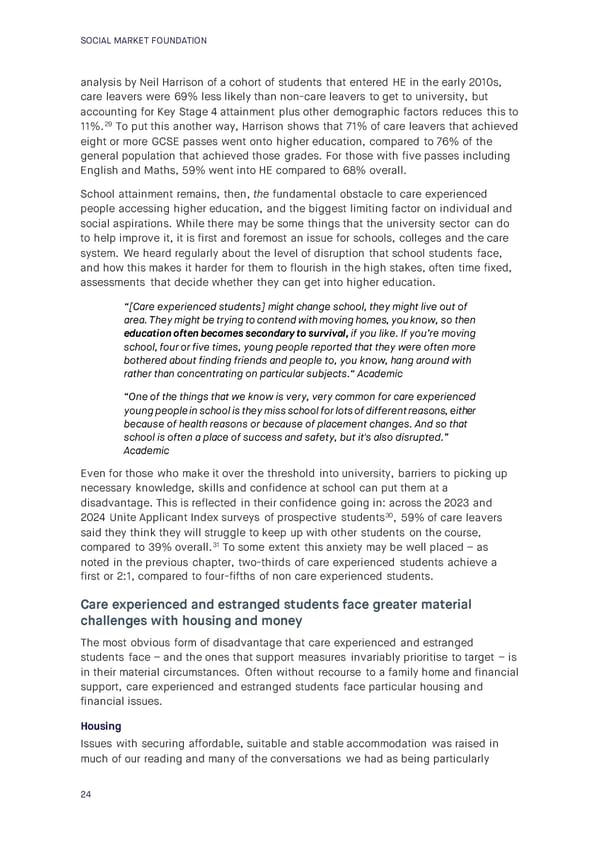SOCIAL MARKET FOUNDATION analysis by Neil Harrison of a cohort of students that entered HE in the early 2010s, care leavers were 69% less likely than non-care leavers to get to university, but accounting for Key Stage 4 attainment plus other demographic factors reduces this to 11%.29 To put this another way, Harrison shows that 71% of care leavers that achieved eight or more GCSE passes went onto higher education, compared to 76% of the general population that achieved those grades. For those with five passes including English and Maths, 59% went into HE compared to 68% overall. School attainment remains, then, the fundamental obstacle to care experienced people accessing higher education, and the biggest limiting factor on individual and social aspirations. While there may be some things that the university sector can do to help improve it, it is first and foremost an issue for schools, colleges and the care system. We heard regularly about the level of disruption that school students face, and how this makes it harder for them to flourish in the high stakes, often time fixed, assessments that decide whether they can get into higher education. “[Care experienced students] might change school, they might live out of area. They might be trying to contend with moving homes, you know, so then education often becomes secondary to survival, if you like. If you’re moving school, four or five times, young people reported that they were often more bothered about finding friends and people to, you know, hang around with rather than concentrating on particular subjects.“ Academic “One of the things that we know is very, very common for care experienced young people in school is they miss school for lots of different reasons, either because of health reasons or because of placement changes. And so that school is often a place of success and safety, but it's also disrupted.” Academic Even for those who make it over the threshold into university, barriers to picking up necessary knowledge, skills and confidence at school can put them at a disadvantage. This is reflected in their confidence going in: across the 2023 and 2024 Unite Applicant Index surveys of prospective students30, 59% of care leavers said they think they will struggle to keep up with other students on the course, compared to 39% overall.31 To some extent this anxiety may be well placed – as noted in the previous chapter, two-thirds of care experienced students achieve a first or 2:1, compared to four-fifths of non care experienced students. Care experienced and estranged students face greater material challenges with housing and money The most obvious form of disadvantage that care experienced and estranged students face – and the ones that support measures invariably prioritise to target – is in their material circumstances. Often without recourse to a family home and financial support, care experienced and estranged students face particular housing and financial issues. Housing Issues with securing affordable, suitable and stable accommodation was raised in much of our reading and many of the conversations we had as being particularly 24
 Care and Learning in Higher Education Page 24 Page 26
Care and Learning in Higher Education Page 24 Page 26